“Global Truck Refrigeration Unit Market to reach a market value of USD 19.8 Billion by 2030 growing at a CAGR of 6.1%”
The Global Truck Refrigeration Unit Market size is expected to reach $19.8 billion by 2030, rising at a market growth of 6.1% CAGR during the forecast period.
The Asia Pacific region has experienced robust economic growth over the past few decades, leading to increased consumer spending power and heightened demand for various goods, including perishable products. Consequently, the Asia Pacific segment captured $4,378.6 million revenue in the market in 2022. As economies expand, so does the need for efficient and reliable transportation solutions, particularly for the growing cold chain industry. Hence, the segment will witness increased demand in the coming years.
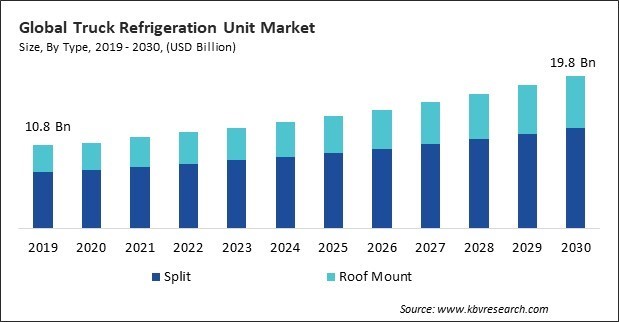
The major strategies followed by the market participants are Product Launches as the key developmental strategy to keep pace with the changing demands of end users. For instance, In September, 2023, Mitsubishi Heavy Industries Thermal Systems, Ltd. has launched the TEJ35GAM, an electric-driven transport refrigeration unit exclusively for small and mid-size trucks. Through this launch, the company will address distribution industry issues. Additionally, In April, 2023, Carrier Transicold, part of Carrier Global Corporation, launched the eCool Truck Refrigeration Series, which will cover 14- to 28-foot, Class 5 to 7 straight truck applications and are designed for fleets seeking regulatory compliance or simply cleaner, more sustainable options.
Based on the Analysis presented in the KBV Cardinal matrix; Denso Corporation, Carrier Global Corporation, Daikin Industries, Ltd., Trane Technologies PLC are the forerunners in the Market. For Instance, In September, 2023, Denso Corporation has launched Everycool, an advanced cooling system that provides comfort and energy efficiency when a commercial vehicle’s engine is off. Through this launch, the company will improve driver working conditions during hot summer seasons, reduce environmental impact, and promote efficient energy utilization by lowering fuel consumption. Companies such as Mitsubishi Heavy Industries Ltd., Subros Limited are some of the key innovators in Market.
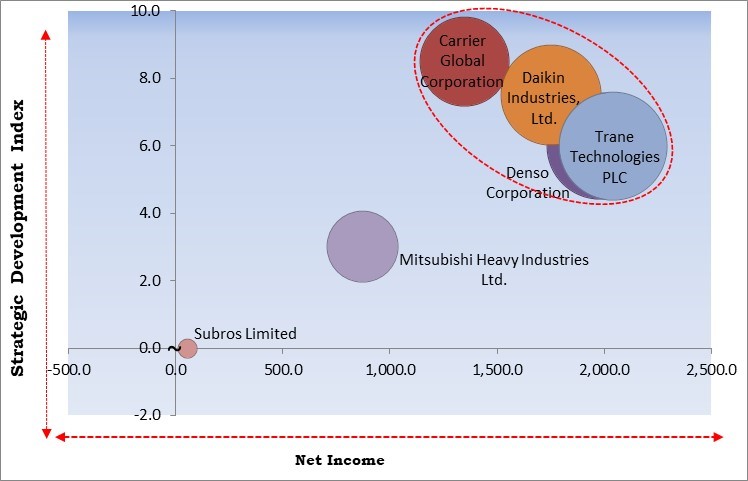
Consumers today increasingly prefer fresh and convenient options, including perishable goods like fruits, vegetables, dairy products, and ready-to-eat meals. To satisfy these preferences, e-commerce platforms need to ensure that the products are delivered to consumers in an identical state of excellence as when they are encountered in brick-and-mortar establishments. This necessitates the use of effective refrigeration solutions in delivery trucks. Thus, these aspects will drive the expansion of the market.
Additionally, Regulatory bodies, such as the Food and Drug Administration (FDA) in the United States and the European Food Safety Authority (EFSA) in Europe, have established stringent guidelines for transporting perishable foods. Good Manufacturing Practice (GMP) regulations also influence the design and operation of refrigeration units. Compliance with GMP ensures that manufacturing and transportation processes meet the required hygiene, cleanliness, and product safety standards. Thus, these aspects can increase demand for TRU in the coming years.
TRU designed to meet advanced environmental standards necessitate incorporating high-quality components and cutting-edge technologies. Fleet operators evaluate the long-term economic feasibility of adopting advanced units, considering fuel efficiency gains, maintenance requirements, and the extended lifespan of environmentally friendly technologies. Thus, these aspects can hamper the growth of the market.
Based on end-user, the market is divided into food, pharmaceutical, chemical industry, and others. The food segment recorded the 41.58% revenue share in the market in 2022. Consumer preferences have evolved, emphasizing a greater reliance on fresh and perishable food. A growing awareness of health and nutrition leads consumers to opt for fresh produce, dairy, meat, and other temperature-sensitive goods.
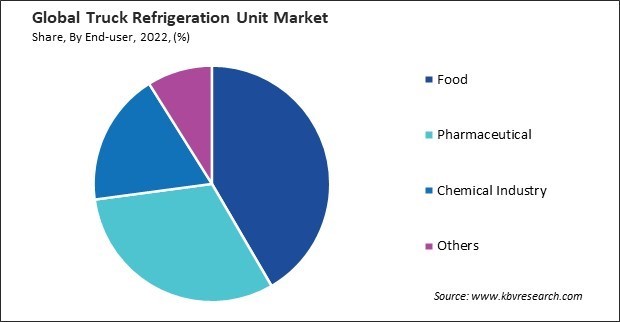
On the basis of type, the market is bifurcated into roof mount and split. In 2022, the split segment witnessed the 67.45% revenue share in the market. Having separate temperature zones within the cargo area is crucial when transporting diverse perishable goods with distinct temperature requirements. This characteristic is especially advantageous when handling combined loads of frozen, chilled, and ambient temperature items concurrently; it provides a more flexible and comprehensive solution for conveying various perishable goods. Therefore, the segment will grow rapidly in the upcoming years.
Based on trailer size, the market is segmented into below 20ft, 20-40ft, and above 40ft. In 2022, the 20-40ft segment garnered a 39.28% revenue share in the market. As a result of the expansion of cold chain logistics and the rising demand for temperature-sensitive products (pharmaceuticals, fresh produce, and frozen commodities), the demand for truck refrigeration units has increased substantially.
Free Valuable Insights: Global Truck Refrigeration Unit Market size to reach USD 19.8 Billion by 2030
By region, the market is segmented into North America, Europe, Asia Pacific, and LAMEA. In 2022, the Europe segment acquired a 27.97% revenue share in the market. Europe's focus on optimizing cold chain efficiency, particularly in transporting perishable goods, has increased demand for advanced and reliable truck refrigeration units.
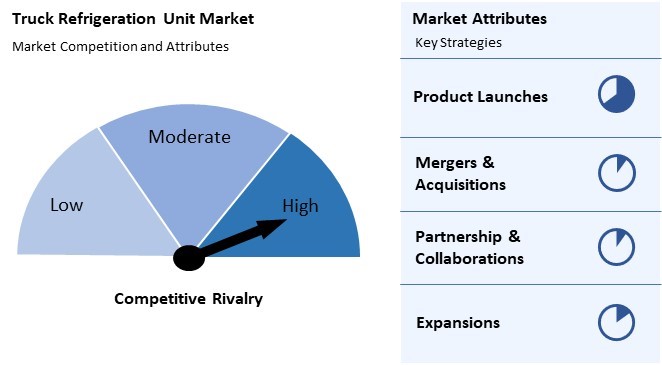
The market is characterized by fierce competition among major players such as Carrier Transicold, Thermo King Corporation, Mitsubishi Heavy Industries, and Denso Corporation, alongside several regional and local manufacturers. This competition is driven by technological advancements in energy efficiency and temperature control, expanding applications across various industries including food and pharmaceuticals, strategic partnerships with truck manufacturers, and a focus on aftermarket services and support. As regulatory standards for temperature-sensitive transportation increase, companies vie for market dominance through innovative product offerings and superior customer service, shaping a highly competitive landscape within the sector.
| Report Attribute | Details |
|---|---|
| Market size value in 2022 | USD 12.4 Billion |
| Market size forecast in 2030 | USD 19.8 Billion |
| Base Year | 2022 |
| Historical Period | 2019 to 2021 |
| Forecast Period | 2023 to 2030 |
| Revenue Growth Rate | CAGR of 6.1% from 2023 to 2030 |
| Number of Pages | 225 |
| Number of Tables | 354 |
| Report coverage | Market Trends, Revenue Estimation and Forecast, Segmentation Analysis, Regional and Country Breakdown, Competitive Landscape, Porter’s 5 Forces Analysis, Company Profiling, Companies Strategic Developments, SWOT Analysis, Winning Imperatives |
| Segments covered | Type, Trailer size, End-user, Region |
| Country scope |
|
| Companies Included | Denso Corporation, Webasto Group, Klinge Corporation, Carrier Global Corporation, Trane Technologies PLC (Thermo King), Daikin Industries, Ltd., Mitsubishi Heavy Industries Ltd., Subros Limited, Arctic Traveler Canada (Advanced Temperature Control), Utility Trailer Manufacturing Company, LLC |
By Type
By Trailer size
By End User
By Geography
The Market size is projected to reach USD $19.8 billion by 2030.
Stringent regulations and compliance standards are driving the Market in coming years, however, Increasing cost of refrigeration technologies restraints the growth of the Market.
Denso Corporation, Webasto Group, Klinge Corporation, Carrier Global Corporation, Trane Technologies PLC (Thermo King), Daikin Industries, Ltd., Mitsubishi Heavy Industries Ltd., Subros Limited, Arctic Traveler Canada (Advanced Temperature Control), Utility Trailer Manufacturing Company, LLC
The expected CAGR of this Market is 6.1% from 2023 to 2030.
The Below 20ft segment is leading the Market by Trailer size in 2022; thereby, achieving a market value of $10.4 billion by 2030.
The Asia Pacific region dominated the Market by Region in 2022, and would continue to be a dominant market till 2030; thereby, achieving a market value of $7.2 billion by 2030.
Our team of dedicated experts can provide you with attractive expansion opportunities for your business.
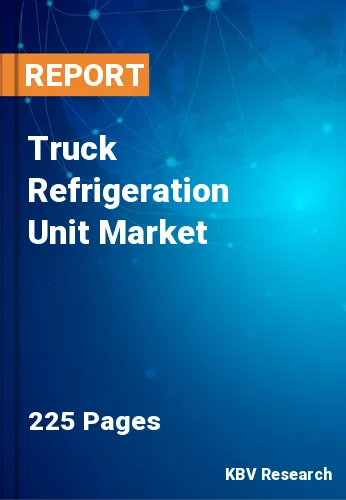
 Drivers
Drivers
 Restraints
Restraints
 Opportunities
Opportunities
 Challenges
Challenges
